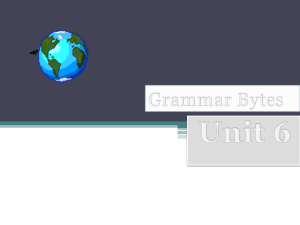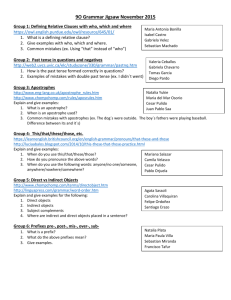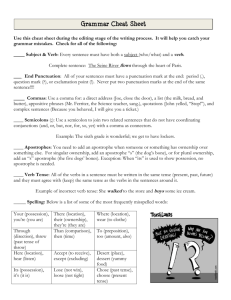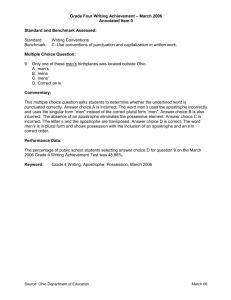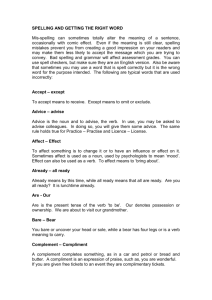Literacy Homework Booklet Summer Y7
advertisement
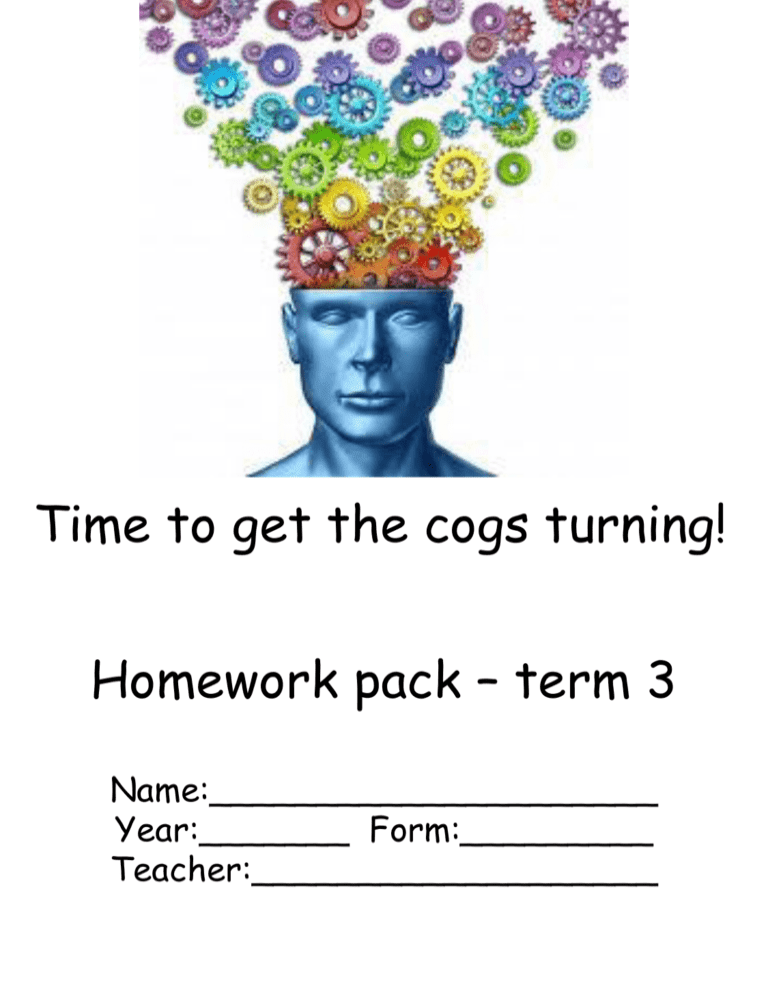
Time to get the cogs turning! Homework pack – term 3 Name:_____________________ Year:_______ Form:_________ Teacher:___________________ Instructions Each week your teacher will tell you exactly which tasks to complete. Always write your homework in your planner. Comprehensions and extended writing should be completed in your homework book. Late homeworks lead to detentions. Section one: Apostrophe To be completed by: ______________________________ What do I need to complete? Spelling test 1 Read the information page on social networking Complete the Re-tweet task Read page on apostrophes Complete the task on apostrophes Complete the task on Don’t and Doesn’t New vocabulary M and N Reading comprehension: Wuthering Heights Self Assessment: What do I still need to practise from this section? Spelling test 1 You will be tested on your spellings in every literacy lesson. You are expected to get at least 17/20 right each time. If you do not manage this you will need to re-take the test at another time. Read Advise Advice Affect Effect Commonly misspelt words Allowed Aloud Bought Brought Breaking Braking Chose Choose Cloth Clothe Topic specific words Analyse Write Cover and write Social networking has unleashed a new trend: bad grammar. We are now surrounded by social media, it is everywhere we look. Most of us like to follow our favourite celebrities but what kind of role model are they to us if they can’t get their spelling and grammar right? In every section of this book there will be a chance to tell these celebrities how to do it properly. You will need to do two things: 1. Explain to this celebrity what they need to do to make sure they don’t make the same error 2. Re-write their post ensuring that it is grammatically correct. I have done this one for you. Miss Killick @MissKEnglish @KimKardashian I noticed in your recent tweet that you have made a few grammatical errors. You have missed out the word ‘are’ in your first sentence and have added too many question marks, only one is required to show this is a question. You would also need a capital letter for ‘Coast’ as it is a proper noun. Well done for using an apostrophe correctly. 4.18 PM – 2 Jan 2015 212 101 Miss Killick @MissKEnglish @KimKardashian here is how you could re-write this text correctly – West Coast are you ready? Tonight’s episode is intense! Tune into E! 4.26 PM – 2 Jan 2015 189 78 Social networking has unleashed a new trend: bad grammar. @ 212 Reply _______________________________________________________________________ _______________________________________________________________________ _______________________________________________________________________ _______________________________________________________________________ _______________________________________________________________________ 101 Re-write @ ___________________________________________________________________ ___________________________________________________________________ ___________________________________________________________________ ___________________________________________________________________ 78 189 @ This space has been left blank for you to find your own celebrity who commits crimes against grammar. ____________________________________________________________ ____________________________________________________________ ____________________________________________________________ ____________________________________________________________ ____________________________________________________________ 189 78 The rules about apostrophes You will have seen in booklet one a little bit about how to use an apostrophe but now we are going to really practice and get those rules embedded into all our work. You never use an apostrophe when you are talking about a plural, for example, you would have one shoe and two shoes – it would never be shoe’s. You use an apostrophe in omission – to omit something is to take it away, this is your root word – in this case, when you omit one or more letters. For example, do not becomes don’t – you use the apostrophe in the place of the o here. You can also use an apostrophe to show posession, before an s to say that one subject of a sentence owns the next subject in a sentence. For example, Katie’s pencil case – this tells us that Katie owns the pencil case. Exception to the rule: If the person or subject already ends in an s then the apostrophe comes after the s and no extra s is added. For example, James’ pile of books. Task: Can you correct these errors? Task: With a green pen, go through the written work below and correct it using our marking scheme. Look out for the incorrect use of homophones and apostrophes. Don’t forget the rules you have learnt. When my workdays over, and I have closed my notebook, hidden my pen, and sawed hole’s in my rented canoe so that it cant be found, I often like to spend the evening in conversation with my few surviving friend’s. Sometime’s we discuss literature. Sometime’s we discuss the people who are trying to destroy us, and if theres any hope of escaping from them. And sometime’s we discuss frightening and troublesome animal’s that might be nearby, and this topic always lead’s to much disagreement over which part of a frightening and troublesome beast is the most frightening and troublesome. Some say the teeth of the beast, because teeth are used for eating children, and often they’re parents, and nawing on there bones. Some say the claw’s of the beast, because claws are used for ripping things to shreds. And some say the hair of the beast, because the hair can make allergic people sneeze. But I always’s insist that the most frightening part of any beast is it’s belly, for the simple reason that if you are seeing the belly of the beast it mean’s you have already seen the teeth and the claw’s of the beast and even the hair of the beast, and now you are trapped and there is probably no hope for you. For this reason, the phrase “in the belly of the best” has become an expression which means “inside some terrible place with little chance of escaping safely,” and its not an expression one should look forward to using. Set this writer a target to move forward with their work. What do they need to improve on specifically? or When we use don’t or doesn’t we use an apostrophe to omit the letter o. Without the apostrophe we have two separate words: Do not This seems simple enough but we often put the wrong word into our writing which means it is grammatically incorrect. When in doubt, use the words without an apostrophe, this way you will make sure it makes sense. Does not Task: Complete the sentences below using the correct word – don’t or doesn’t. 1. 2. 3. 4. 5. 6. 7. 8. The cat _____________ want to go out in the rain. __________ step in the mud and then come in the house with your trainers on. It ____________ matter if you _________ get the right answer, as long as you try. Life is short, ____________ let it pass you by. I _________ want to get up early in the morning. I don’t believe that Romeo is cruel as he ________ intentionally fall in love with Juliet. Curley’s Wife ______ deserve to be called names because she is mistreated by Curley. He __________ like me because I am better football player than he is. Word (Adjective) Letter M Definition Sentence (using your word): Synonyms Antonyms Letter Word (Adjective) N Definition Sentence (using your word): Synonyms Antonyms Wuthering Heights by Emily Bronte Reading comprehension : Read the extract and answer the questions in as much detail as possible. The narrator, Mr Lockwood, is here visiting Wuthering Heights. He was prevented by heavy snow from leaving for home but Heathcliff, the bad tempered owner of Wuthering Heights is unwilling to let Lockwood stay the night. A servant takes pity on him, and shows him upstairs, where he finds an unused room in which he decides to spend the night. He is unable to sleep because of noises outside the window and disturbing dreams. This time, I remembered I was lying in the oak closet, and I heard distinctly the gusty wind, and the driving of the snow; I heard, also, the fir bough repeat its teasing sound, and ascribed it to the right cause: but it annoyed me so much, that I resolved to silence it, if possible; and, I thought, I rose and endeavoured to unhasp the casement. The hook was soldered into the staple: a circumstance observed by me when awake, but forgotten. 'I must stop it, nevertheless!' I muttered, knocking my knuckles through the glass, and stretching an arm out to seize the importunate branch; instead of which, my fingers closed on the fingers of a little, ice-cold hand! The intense horror of nightmare came over me: I tried to draw back my arm, but the hand clung to it, and a most melancholy voice sobbed, 'Let me in--let me in!' 'Who are you?' I asked, struggling, meanwhile, to disengage myself. 'Catherine Linton,' it replied, shiveringly (why did I think of Linton? I had read Earnshaw twenty times for Linton). 'I'm come home: I'd lost my way on the moor!' As it spoke, I discerned, obscurely, a child's face looking through the window. Terror made me cruel; and, finding it useless to attempt shaking the creature off, I pulled its wrist on to the broken pane, and rubbed it to and fro till the blood ran down and soaked the bedclothes: still it wailed, 'Let me in!' and maintained its tenacious grip, almost maddening me with fear. 'How can I!' I said at length. 'Let me go, if you want me to let you in!' The fingers relaxed, I snatched mine through the hole, hurriedly piled the books up in a pyramid against it, and stopped my ears to exclude the lamentable prayer. I seemed to keep them closed above a quarter of an hour; yet, the instant I listened again, there was the doleful cry moaning on! 'Begone!' I shouted. 'I'll never let you in, not if you beg for twenty years.' 'It is twenty years,' mourned the voice: 'twenty years. I've been a waif for twenty years!' Thereat began a feeble scratching outside, and the pile of books moved as if thrust forward. I tried to jump up; but could not stir a limb; and so yelled aloud, in a frenzy of fright. To my confusion, I discovered the yell was not ideal: hasty footsteps approached my chamber door; somebody pushed it open, with a vigorous hand, and a light glimmered through the squares at the top of the bed. I sat shuddering yet, and wiping the perspiration from my forehead: the intruder appeared to hesitate, and muttered to himself. At last, he said, in a half-whisper, plainly not expecting an answer, 'Is anyone here?' I considered it best to confess my presence; for I knew Heathcliff's accents, and feared he might search further, if I kept quiet. With this intention, I turned and opened the panels. I shall not soon forget the effect my action produced. uestions 1. 2. 3. How does Bronte build up fear in the passage? How is this reflected in the way the narrator acts and talks? Why did Lockwood have to break the glass? 4. What are the definitions of these words: 5. 6. Tenacious Importunate Casement Ascribed Unhasp Discerned Doleful Obscurely What is the narrator’s attitude towards Catherine Linton? How do we know this? Extended writing task: Using the image write a paragraph describing East Riddlesden Hall. Think about your choice of adjectives. Section two: Semi-colon To be completed by: ______________________________ What do I need to complete over the next two weeks? Spelling test 2 Complete the re-tweet task Read the semi-colon page Complete the semi-colon task Complete the second semi-colon task New Vocabulary: O and P Reading comprehension: Never Let Me Go Self Assessment: What do I still need to practise from this section? Spelling test 2 You will be tested on your spellings in every literacy lesson. You are expected to get at least 17/20 right each time. If you do not manage this you will need to re-take the test at another time. Read Course Coarse Quiet Quite Commonly misspelt words Sites Sights Sauce Source Threw Through Irrelevant Irrelevance Anthology Apostrophe Topic specific words Atmosphere Write Cover and write Social networking has unleashed a new trend: bad grammar. @ 212 Reply _______________________________________________________________________ _______________________________________________________________________ _______________________________________________________________________ _______________________________________________________________________ _______________________________________________________________________ 101 Re-write @ ___________________________________________________________________ ___________________________________________________________________ ___________________________________________________________________ ___________________________________________________________________ 78 189 @ This space has been left blank for you to find your own celebrity who commits crimes against grammar. ____________________________________________________________ ____________________________________________________________ ____________________________________________________________ ____________________________________________________________ ____________________________________________________________ 189 78 What is a semicolon? And how do we use one correctly? A semi colon can be used in several ways but it must be used correctly. We are going to look at how and where to use a semicolon correctly. The main way to use a semicolon is to join two main clauses together. The stars shone brightly in the sky. The sky was a dark, inky blue. You can remove the full stop and put in a semicolon and it will still make sense. You could also use a semicolon in the place of a connective such as and. Semicolons should also be used to join two sentences that are either, linked together or if you are trying to show a real comparison. Don’t forget to change your capital letter at the beginning of the next sentence when you add your semicolon. The stars shone brightly in the sky; the sky was a dark, inky blue. Hazard: Never use a semicolon with a conjunction (but, so, or, nor, for, yet – save that for your comma) Use a semi colon as a super-comma You can also use a semicolon to create a list where you need to use a comma in a different capacity, for example when you need to use a comma to separate two places – I travelled to London, England; New York, USA; Paris, France; and Rome, Italy. Use a semi colon for a super sentence You can extend the skills from the first box and join two complex sentences together. Dashing through the rain, the cloaked man slipped on the shimmering paving stone. The silver car darted by, splashing the man as he ran hurriedly. Turns into... Dashing through the rain, the cloaked man slipped on the shimmering paving stone; the silver car darted by, splashing the man as he ran hurriedly. Using the rules about semicolons on the previous page, write a short story using the items below and all different styles of semicolon. A broken watch An aerobics class A small lie A campfire Word (Adjective) Letter O Definition Sentence (using your word): Synonyms Antonyms Word (Adjective) Letter P Definition Sentence (using your word): Synonyms Antonyms Never Let Me Go by Kazuo Ishiguro Reading comprehension : Read the extract and answer the questions in as much detail as possible. Driving around the country now, I still see things that will remind me of Hailsham. I might pass the corner of a misty field, or see part of a large house in the distance as I come down the side of the valley, even a particular arrangement of poplar trees up on a hillside, and I’ll think: ‘Maybe that’s it! I’ve found it! This actually is Hailsham!’ Then I see it’s impossible and I go on driving, my thoughts drifting on elsewhere. In particular, there are those pavilions. I spot them all over the country, standing on the far side of the playing fields, little white prefab buildings with a row of windows unnaturally high up, tucked almost under the eaves. I think they built a whole lot like that in the fifties and sixties, which is probably when ours was put up. If i drive past one I keep looking over to it for as long as possible, and one day I’ll crash the car like that, but I keep doing it. Not long ago I was driving through an empty stretch of Worcestershire and saw one beside a cricket ground so like ours at Hailsham I actually turned the car around and went back for a second look. We loved our sports pavilion, maybe because it reminded us of those sweet little cottages people always had in picture books when we were young. I can remember us back in the Juniors, pleading with the guardians to hold the next lesson in the pavilion instead of the usual room. Then by the time we were in Senior 2 when we were twelve, going on thirteen – the pavilion had become the place to hide out with your best friends when you wanted to get away from the rest of Hailsham. The pavilion was big enough to take two separate groups without them bothering each other – in the summer, a third group could hang about on the veranda. But ideally you and your friends wanted the place just to yourselves, so there was often jockeying and arguing. The guardians were always telling us to be civilised about it, but in practice, you needed to have some strong personalities in your group to stand a chance of getting the pavilion during a break or free period. I wasn’t exactly the wilting type myself, but I suppose it was really because of Ruth we got in there as often as we did. Usually we just spread ourselves around the chairs and benches – there’d be five of use, six if Jenny B. Came along – and had a good gossip. There was a kind of conversation that could happen when you were hidden away in the pavilion; we might discuss something that was worrying us, or we might end up screaming with laughter, or in a furious row. Mostly, it was a way to unwind for a while with your closest friends. On the particular afternoon I’m now thinking of, we were standing up on stools and benches, crowding around the North Playing Field where about a dozen boys from our year and Senior 3 had gathered to play football . There was a bright sunshine, but it must have been raining earlier that day because I can remember how the sun was glinting on the muddy surface of the grass. someone said we shouldn’t be so obvious about watching, but we hardly moved back at all. The Ruth said: ‘He doesn’t suspect a thing. Look at him. He really doesn’t suspect a thing.’ When she said this, I looked at her and searched for signs of disapproval about what the boys were going to do to Tommy. But the next second Ruth gave a little laugh and said: ‘The idiot!’ uestions 1. Kathy is the narrator. How is she portrayed in this opening? How do we know this? 2. What do you think the pavilion symbolises and why? 3. Who do you think the ‘guardians’ are? Explain your ideas. 4. What do you think ‘Hailsham’ is? Explain your answer. 5. How do you think Ruth is portrayed? How do we know this? 6. The story is in first person, what do you think the importance of doing this is? 7. We learn a lot about Kathy’s past, why do you think this is important? Section three: Past, present, future To be completed by: ______________________________ What do I need to complete over the next two weeks? Spelling test 3 Complete the re-tweet task Revise past, present and future tenses; and singular and plural. Complete task 1 on The Twits Complete the extended writing task on The Twits New vocabulary Q and R Read and answer the questions on Pride and Prejudice Self Assessment: What do I still need to practise from this section? Spelling test 3 You will be tested on your spellings in every literacy lesson. You are expected to get at least 17/20 right each time. If you do not manage this you will need to re-take the test at another time. Read Clause Comparison Conjunction Consonant Commonly misspelt words Dialogue Exclamation Expression Figurative Imagery Metaphor Narrative Paragraph Plural Preposition Topic specific words Resolution Write Cover and write Social networking has unleashed a new trend: bad grammar. @ 212 Reply _______________________________________________________________________ _______________________________________________________________________ _______________________________________________________________________ _______________________________________________________________________ _______________________________________________________________________ 101 Re-write @ ___________________________________________________________________ ___________________________________________________________________ ___________________________________________________________________ ___________________________________________________________________ 78 189 @ This space has been left blank for you to find your own celebrity who commits crimes against grammar. ____________________________________________________________ ____________________________________________________________ ____________________________________________________________ ____________________________________________________________ ____________________________________________________________ 189 78 Past tense Present tense Future tense We use the past tense to talk about things that have already happened. We use the present tense to talk about things that are happening now. We use the future tense to talk about things that are going to happen. Last term we talked about different tenses and plural and singular words – this term we are going to combine these and talk about when and how to use the verb to be. Key: Past tense Present tense Single Future tense Plural (Talking about one person) (Talking about two or more people) I am I was We are We were You are You were You are You were He is He was They are They were She is She was It is It was All of the present tense starters can be converted into future tense depending on the auxiliary verb (see your first booklet) that you choose to follow the main verb. Example I am having a great day at the funfair. I am going to have a great day at the funfair. An extract from The Twits by Roald Dahl. Task 1: Circle the correct single or plural. The Twits is/are nasty. Mr Twit is/are hairy and Mrs Twit is/are ugly. They is/are the most horrible people you will ever read about. Mr Twit and Mrs Twit is/are always thinking of nasty tricks to play on each other. When Mrs Twit was/were angry, she gave Mr Twit worms to eat. He didn’t know that there was/were worms in his dinner. He thought that he was/were eating spaghetti. He wondered why his dinner was moving. Task 2: Write the next part of the story about The Twits and their terrible, nasty tricks. Be sure to include all of the sentence starters here. This will mean you have to use more than one paragraph to show a change in time. Single Plural I am I was We are We were You are You were You are You were He is He was They are They were She is She was It is It was All of the present tense starters can be converted into future tense depending on the auxiliary verb (see your first booklet) that you choose to follow the main verb. Word (Adjective) Letter Q Definition Sentence (using your word): Synonyms Antonyms Word (Adjective) Letter R Definition Sentence (using your word): Synonyms Antonyms Pride and Prejudice by Jane Austen Reading comprehension : Read the extract and answer the questions in as much detail as possible. It is a truth universally acknowledged that a single man in possession of a good fortune must be in want of a wife. However little known the feelings or views of such a man may be on his first entering a neighbourhood, this truth is so well fixed in the minds of the surrounding families, that he is considered the rightful property of someone or other of their daughters. "My dear Mr. Bennet," said his lady to him one day, "have you heard that Netherfield Park is let at last?" Mr. Bennet replied that he had not. "But it is," returned she; "for Mrs. Long has just been here, and she told me all about it." Mr. Bennet made no answer. "Do you not want to know who has taken it?" cried his wife impatiently. "You want to tell me, and I have no objection to hearing it." This was invitation enough. "Why, my dear, you must know, Mrs. Long says that Netherfield is taken by a young man of large fortune from the north of England; that he came down on Monday in a chaise and four to see the place, and was so much delighted with it, that he agreed with Mr. Morris immediately; that he is to take possession before Michaelmas, and some of his servants are to be in the house by the end of next week." "What is his name?" "Bingley." "Is he married or single?” "Oh! Single, my dear, to be sure! A single man of large fortune; four or five thousand a year. What a fine thing for our girls!" "How so? How can it affect them?" "My dear Mr. Bennet," replied his wife, "how can you be so tiresome! You must know that I am thinking of his marrying one of them." "Is that his design in settling here?" "Design! Nonsense, how can you talk so! But it is very likely that he may fall in love with one of them, and therefore you must visit him as soon as he comes." "I see no occasion for that. You and the girls may go, or you may send them by themselves, which perhaps will be still better, for as you are as handsome as any of them, Mr. Bingley may like you the best of the party.“ "My dear, you flatter me. I certainly have had my share of beauty, but I do not pretend to be anything extraordinary now. When a woman has five grown-up daughters, she ought to give over thinking of her own beauty." "In such cases, a woman has not often much beauty to think of." "But, my dear, you must indeed go and see Mr. Bingley when he comes into the neighbourhood." "It is more than I engage for, I assure you." "But consider your daughters. Only think what an establishment it would be for one of them. Sir William and Lady Lucas are determined to go, merely on that account, for in general, you know, they visit no newcomers. Indeed you must go, for it will be impossible for us to visit him if you do not." "You are over-scrupulous, surely. I dare say Mr. Bingley will be very glad to see you; and I will send a few lines by you to assure him of my hearty consent to his marrying whichever he chooses of the girls; though I must throw in a good word for my little Lizzy." "I desire you will do no such thing. Lizzy is not a bit better than the others; and I am sure she is not half as handsome as Jane, nor half as good-humoured as Lydia. But you are always giving her the preference." uestions: 1. 2. 3. 4. 5. How is Mrs Bennett portrayed when we first meet her in Pride and Prejudice? How is Mr Bennett portrayed at the beginning of the novel? What does the opening tell us about life in 19th Century England? Even though we do not meet Lizzie, what relationship does she have with her parents? What is the role of a single man in 19th century England? How do we know this? Discuss the following point and explain why you agree or disagree: Men and women have vastly different roles in today’s society in comparison to the men and women in Pride and Prejudice. Spelling test time Test 2 Test 3 Topic specific words Commonly misspelt words Test 1 Total: /20 Total: /20 Total: /20 Choose your words wisely! Relevant Interesting Ambitious
